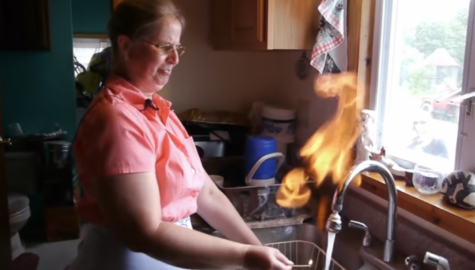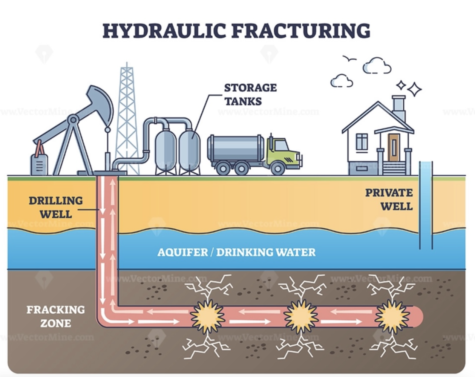
Amanda Dirpes | Writer
January 20, 2023
It is no secret that oiling and landfill impact Earth’s groundwater, and recently, fracking and dumping ground in the Midwest to East Coast states have leached methane into their wells—so much so that when one holds a lighter up to a running tap, a flame erupts from the spout.
A combustible, colorless, and odorless gas, methane (CH4) is naturally formed by numerous organisms’ digesting processes and the breakdown of organic matter, but Anthropocene forces have accelerated CH4’s release. In northeastern regions of the United States, methane concentrations in groundwater are naturally high. Fracking, the process of injecting pressurized liquid into the earth in order to fracture bedrock and release the oil, is a plausible cause of these raised methane levels. This is because stores of natural gas (including CH4) exist next to these oil reservoirs. A landfill or subterranean methane storage area leak may also be to blame for the presence of methane in groundwater.

“I learned about the importance of clean groundwater in AP Environmental Science last year,” senior Emily Atkinson explained. “If foreign substances are leached into the reservoir, it can potentially harm the people who rely on the source for drinking water.”
Furthermore, methane leaks may result in lower oxygen levels and a risk of fire or explosion. Methane itself is not dangerous, but its release indoors can reduce the amount of oxygen present and make breathing difficult. Although methane in groundwater is not explosive, it can escape from the water when it comes into contact with air. There is a risk of fire or an explosion if this happens indoors. The risk exists even though large concentrations of dissolved methane alone are uncommon. (Stairsupplies) If there is a lot of bubbling in the water, it is advised to test the water for methane.
But what is the solution? Until legislation against fracking and cleaner landfill practices is made, one can install a water treatment device intended to remove dissolved methane.
“My family has a water filter in our garage, but I did not realize our water could be flammable without it!” senior Courtney Coulson said.
The concentration of dissolved methane in water can also be lowered by implementing an aeration unit into their filtration system which removes both CH4 and other potentially harmful chemicals such as radon. These changes are easy to implement while, in the meantime, society finds a more permanent solution to the deeper issue.

Leave a Reply